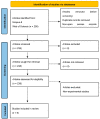Cognitive Gain in Digital Foreign Language Learning
- PMID: 37509006
- PMCID: PMC10376944
- DOI: 10.3390/brainsci13071074
Cognitive Gain in Digital Foreign Language Learning
Abstract
This systematic review examines the potential of digital language learning in contributing to students' cognitive gains. The study reviews existing research on the relationship between digital language learning and cognitive benefits, with a focus on enhanced problem-solving skills, memory, and multitasking ability. The research questions explored in this study are (1) does digital language learning contribute to cognitive gains in foreign language education? and (2) what are the pedagogical implications for cognitive improvement in digital foreign language education? The study employs the Preferred Reporting Items for Systematic Reviews and Meta-Analyses (PRISMA) methodology to identify and analyze relevant research articles. The results of the review suggest that working with printed texts may be more effective for cognitive gains compared to electronic texts. Additionally, implementing more senses through digital language education appears to be beneficial for cognitive gains. Thus, several pedagogical implications emerge for promoting cognitive improvement in digital foreign language education. Firstly, it is crucial to implement techniques and strategies that best align with students' language needs in a digital learning environment, whether it involves pen-and-paper activities or a flipped classroom approach. Secondly, exposing students to a variety of techniques that engage multiple senses can have a positive impact on cognitive gains. Finally, providing students with feedback is essential to maintain their motivation and foster continued progress in their foreign language studies.
Keywords: cognitive benefits; cognitive improvement; foreign language learning; second language.
Conflict of interest statement
The authors declare no conflict of interest.
Figures
Similar articles
-
Multimodal immersion in English language learning in higher education: A systematic review.Heliyon. 2024 Sep 24;10(19):e38357. doi: 10.1016/j.heliyon.2024.e38357. eCollection 2024 Oct 15. Heliyon. 2024. PMID: 39398027 Free PMC article.
-
The future of Cochrane Neonatal.Early Hum Dev. 2020 Nov;150:105191. doi: 10.1016/j.earlhumdev.2020.105191. Epub 2020 Sep 12. Early Hum Dev. 2020. PMID: 33036834
-
The effectiveness of internet-based e-learning on clinician behavior and patient outcomes: a systematic review protocol.JBI Database System Rev Implement Rep. 2015 Jan;13(1):52-64. doi: 10.11124/jbisrir-2015-1919. JBI Database System Rev Implement Rep. 2015. PMID: 26447007
-
Digital learning designs in physiotherapy education: a systematic review and meta-analysis.BMC Med Educ. 2021 Jan 13;21(1):48. doi: 10.1186/s12909-020-02483-w. BMC Med Educ. 2021. PMID: 33441140 Free PMC article.
-
Flipped classroom improves student learning outcome in Chinese pharmacy education: A systematic review and meta-analysis.Front Pharmacol. 2022 Aug 30;13:936899. doi: 10.3389/fphar.2022.936899. eCollection 2022. Front Pharmacol. 2022. PMID: 36110553 Free PMC article.
References
-
- Zhang C. The advantages and disadvantages of learning a second language early. Adv. Soc. Sci. Educ. Humanit. Res. 2021;631:32–37.
-
- Park J. Vocabulary learning through a daily task of cooking in the digital kitchen. Lang. Learn. Technol. 2022;26:1–22.
Publication types
LinkOut - more resources
Full Text Sources


